Economic Crime: Comprehensive Analysis of Fraud Prevention Techniques
VerifiedAdded on 2020/05/16
|9
|1837
|70
Report
AI Summary
This report on economic crime delves into various methods to ensure effective fraud prevention within organizations. It highlights the importance of strong internal controls, ethical organizational culture, and the roles of top management, audit committees, and internal auditors. The report discusses the significance of internal control as a dynamic tool, emphasizing the need for comprehensive risk reviews and fraud-resistant organizational traits. It explores the roles of different management levels, legal counsel, and corporate security in fraud prevention. Furthermore, the report outlines a comprehensive fraud prevention plan, including strategies such as segregation of accounting functions, establishing an ethical environment, and conducting fraud risk assessments. The conclusion reinforces the need for continuous review and evaluation of internal controls in response to changing business environments and fraudulent activities.
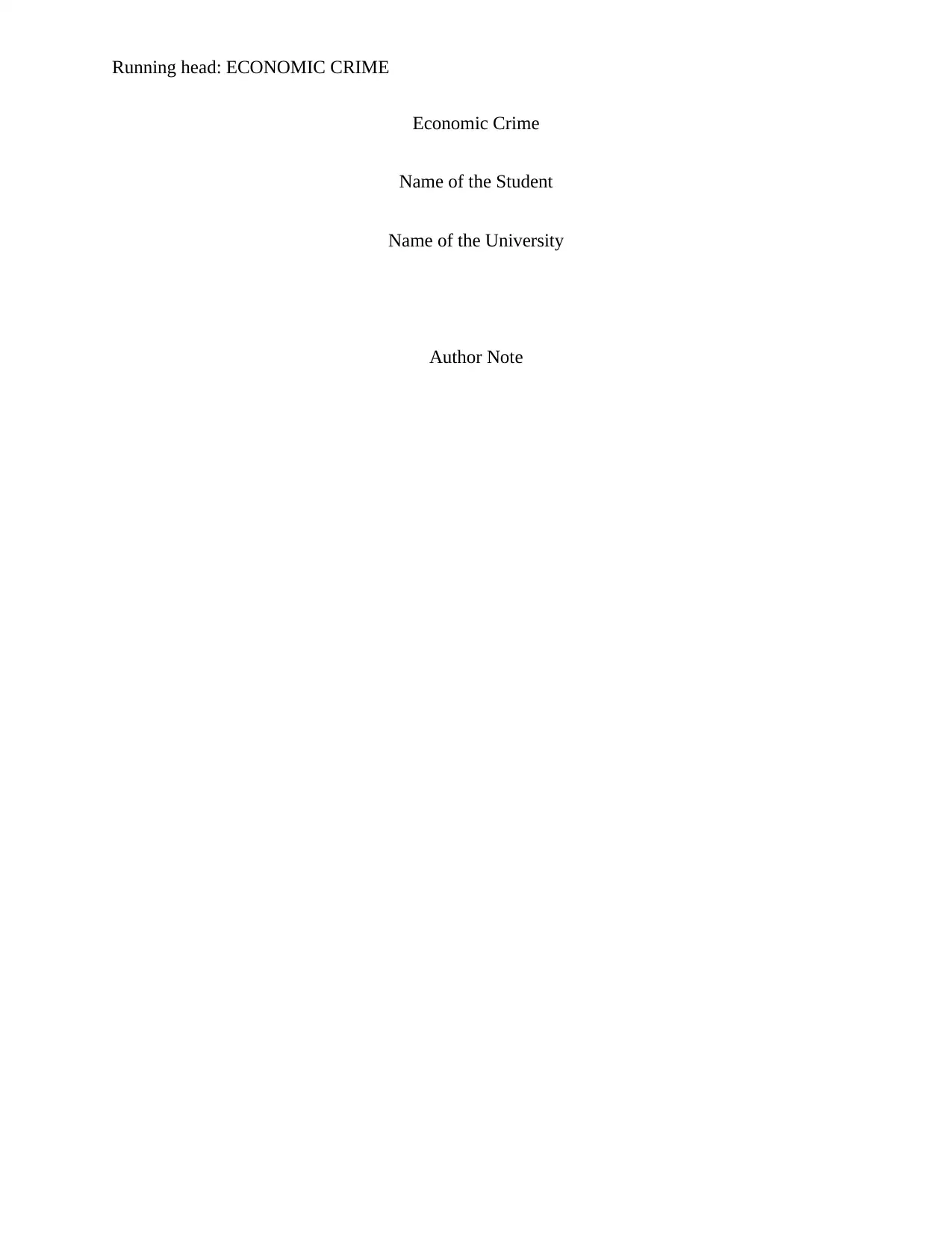
Running head: ECONOMIC CRIME
Economic Crime
Name of the Student
Name of the University
Author Note
Economic Crime
Name of the Student
Name of the University
Author Note
Paraphrase This Document
Need a fresh take? Get an instant paraphrase of this document with our AI Paraphraser
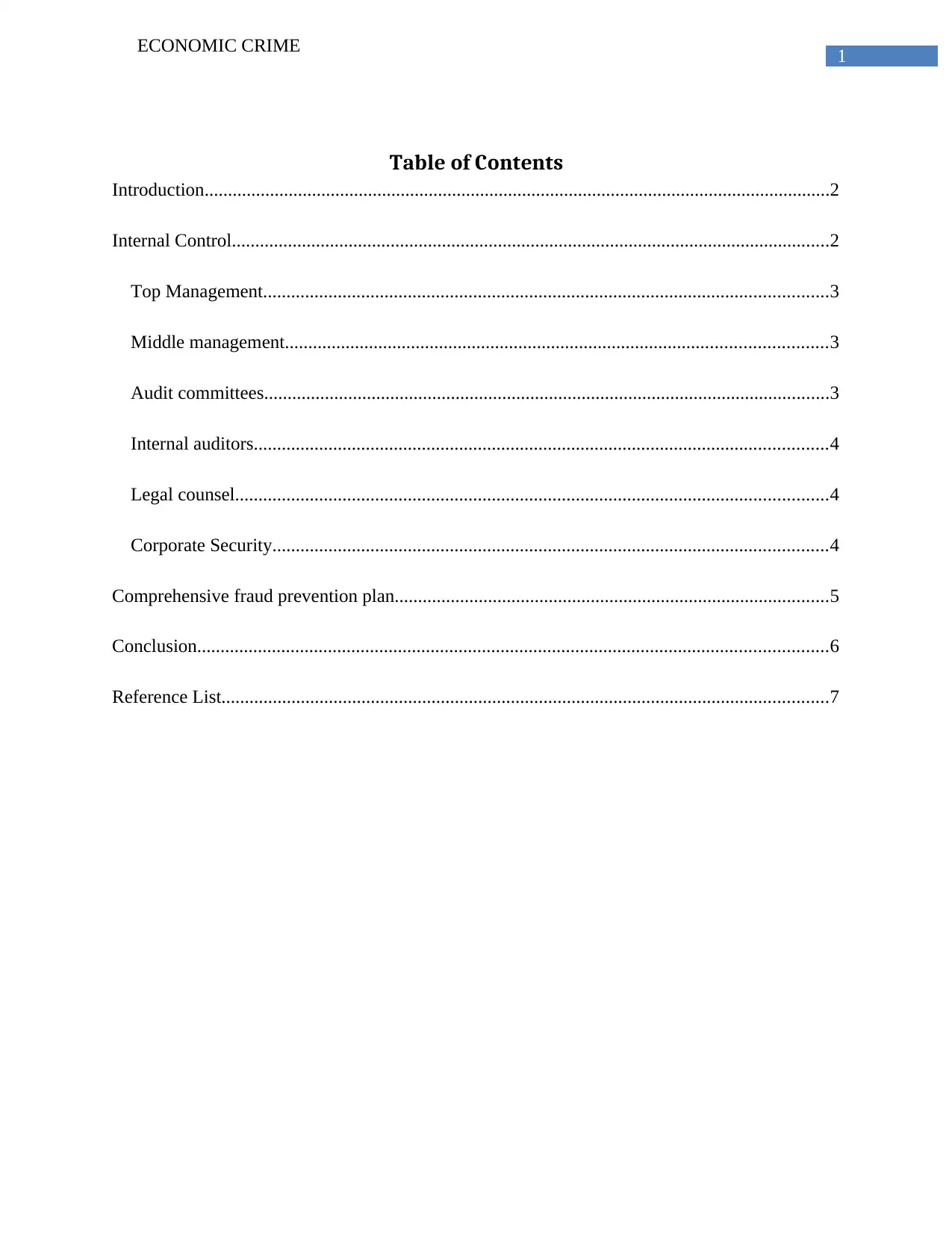
1
ECONOMIC CRIME
Table of Contents
Introduction......................................................................................................................................2
Internal Control................................................................................................................................2
Top Management.........................................................................................................................3
Middle management....................................................................................................................3
Audit committees.........................................................................................................................3
Internal auditors...........................................................................................................................4
Legal counsel...............................................................................................................................4
Corporate Security.......................................................................................................................4
Comprehensive fraud prevention plan.............................................................................................5
Conclusion.......................................................................................................................................6
Reference List..................................................................................................................................7
ECONOMIC CRIME
Table of Contents
Introduction......................................................................................................................................2
Internal Control................................................................................................................................2
Top Management.........................................................................................................................3
Middle management....................................................................................................................3
Audit committees.........................................................................................................................3
Internal auditors...........................................................................................................................4
Legal counsel...............................................................................................................................4
Corporate Security.......................................................................................................................4
Comprehensive fraud prevention plan.............................................................................................5
Conclusion.......................................................................................................................................6
Reference List..................................................................................................................................7
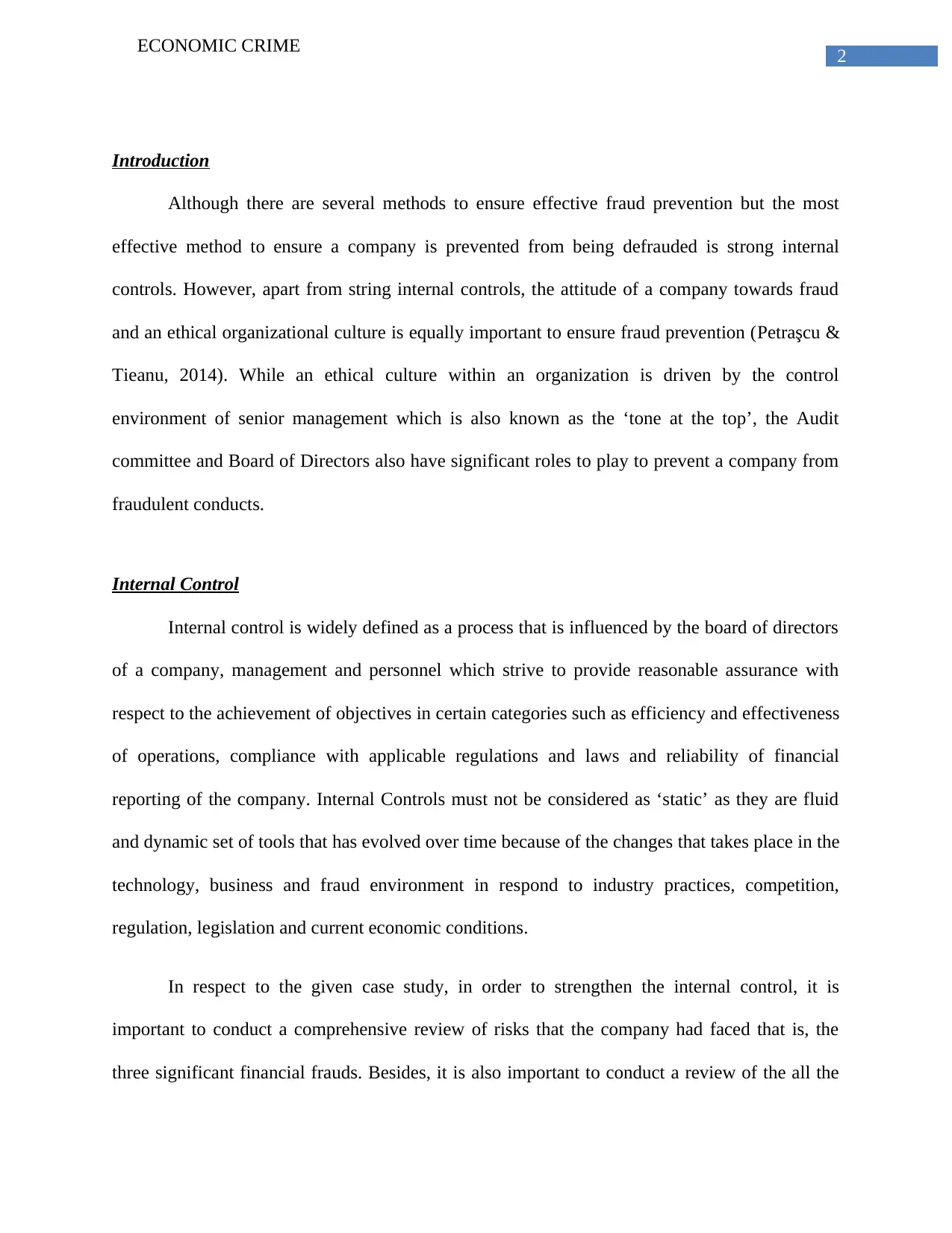
2
ECONOMIC CRIME
Introduction
Although there are several methods to ensure effective fraud prevention but the most
effective method to ensure a company is prevented from being defrauded is strong internal
controls. However, apart from string internal controls, the attitude of a company towards fraud
and an ethical organizational culture is equally important to ensure fraud prevention (Petraşcu &
Tieanu, 2014). While an ethical culture within an organization is driven by the control
environment of senior management which is also known as the ‘tone at the top’, the Audit
committee and Board of Directors also have significant roles to play to prevent a company from
fraudulent conducts.
Internal Control
Internal control is widely defined as a process that is influenced by the board of directors
of a company, management and personnel which strive to provide reasonable assurance with
respect to the achievement of objectives in certain categories such as efficiency and effectiveness
of operations, compliance with applicable regulations and laws and reliability of financial
reporting of the company. Internal Controls must not be considered as ‘static’ as they are fluid
and dynamic set of tools that has evolved over time because of the changes that takes place in the
technology, business and fraud environment in respond to industry practices, competition,
regulation, legislation and current economic conditions.
In respect to the given case study, in order to strengthen the internal control, it is
important to conduct a comprehensive review of risks that the company had faced that is, the
three significant financial frauds. Besides, it is also important to conduct a review of the all the
ECONOMIC CRIME
Introduction
Although there are several methods to ensure effective fraud prevention but the most
effective method to ensure a company is prevented from being defrauded is strong internal
controls. However, apart from string internal controls, the attitude of a company towards fraud
and an ethical organizational culture is equally important to ensure fraud prevention (Petraşcu &
Tieanu, 2014). While an ethical culture within an organization is driven by the control
environment of senior management which is also known as the ‘tone at the top’, the Audit
committee and Board of Directors also have significant roles to play to prevent a company from
fraudulent conducts.
Internal Control
Internal control is widely defined as a process that is influenced by the board of directors
of a company, management and personnel which strive to provide reasonable assurance with
respect to the achievement of objectives in certain categories such as efficiency and effectiveness
of operations, compliance with applicable regulations and laws and reliability of financial
reporting of the company. Internal Controls must not be considered as ‘static’ as they are fluid
and dynamic set of tools that has evolved over time because of the changes that takes place in the
technology, business and fraud environment in respond to industry practices, competition,
regulation, legislation and current economic conditions.
In respect to the given case study, in order to strengthen the internal control, it is
important to conduct a comprehensive review of risks that the company had faced that is, the
three significant financial frauds. Besides, it is also important to conduct a review of the all the
⊘ This is a preview!⊘
Do you want full access?
Subscribe today to unlock all pages.

Trusted by 1+ million students worldwide
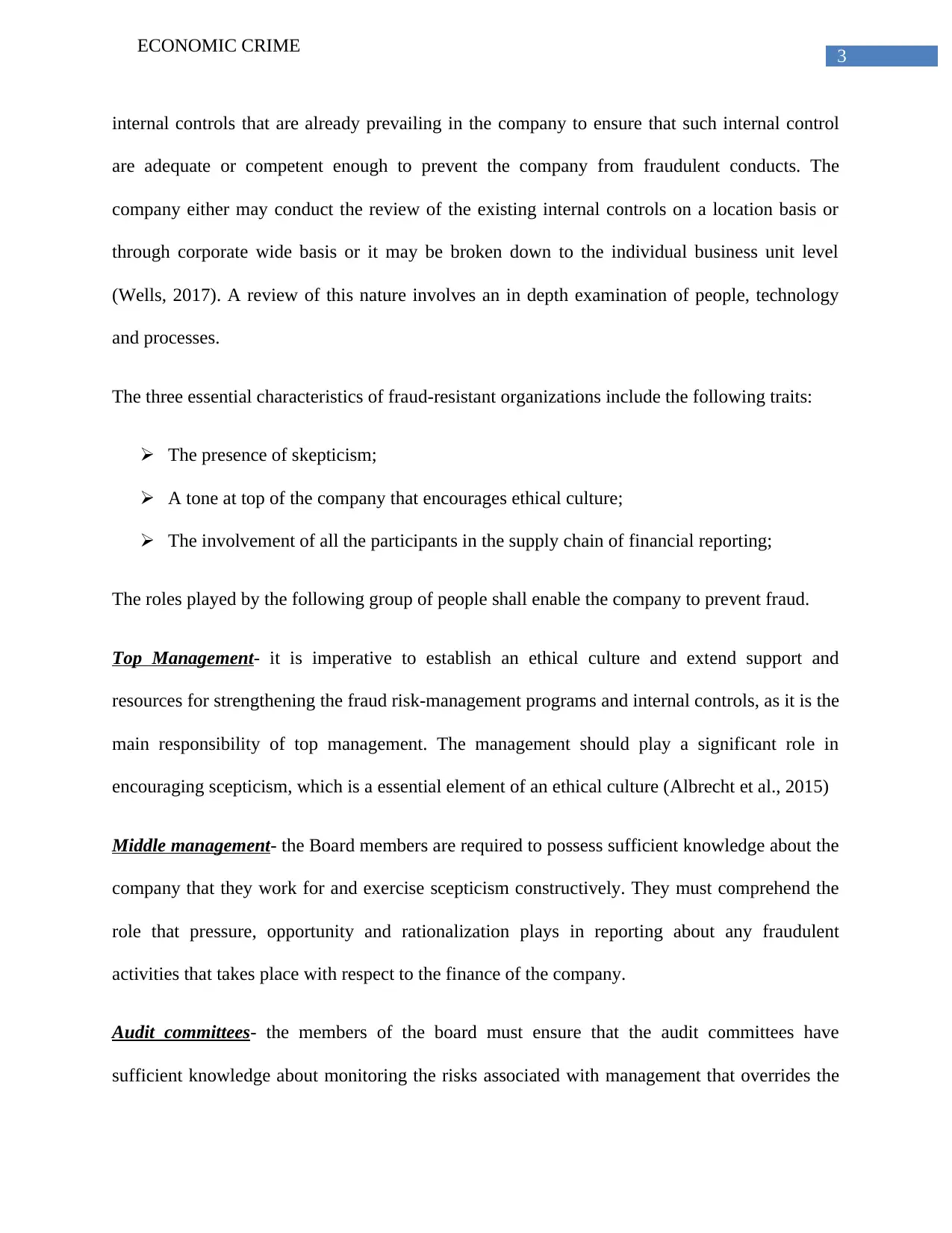
3
ECONOMIC CRIME
internal controls that are already prevailing in the company to ensure that such internal control
are adequate or competent enough to prevent the company from fraudulent conducts. The
company either may conduct the review of the existing internal controls on a location basis or
through corporate wide basis or it may be broken down to the individual business unit level
(Wells, 2017). A review of this nature involves an in depth examination of people, technology
and processes.
The three essential characteristics of fraud-resistant organizations include the following traits:
The presence of skepticism;
A tone at top of the company that encourages ethical culture;
The involvement of all the participants in the supply chain of financial reporting;
The roles played by the following group of people shall enable the company to prevent fraud.
Top Management- it is imperative to establish an ethical culture and extend support and
resources for strengthening the fraud risk-management programs and internal controls, as it is the
main responsibility of top management. The management should play a significant role in
encouraging scepticism, which is a essential element of an ethical culture (Albrecht et al., 2015)
Middle management- the Board members are required to possess sufficient knowledge about the
company that they work for and exercise scepticism constructively. They must comprehend the
role that pressure, opportunity and rationalization plays in reporting about any fraudulent
activities that takes place with respect to the finance of the company.
Audit committees- the members of the board must ensure that the audit committees have
sufficient knowledge about monitoring the risks associated with management that overrides the
ECONOMIC CRIME
internal controls that are already prevailing in the company to ensure that such internal control
are adequate or competent enough to prevent the company from fraudulent conducts. The
company either may conduct the review of the existing internal controls on a location basis or
through corporate wide basis or it may be broken down to the individual business unit level
(Wells, 2017). A review of this nature involves an in depth examination of people, technology
and processes.
The three essential characteristics of fraud-resistant organizations include the following traits:
The presence of skepticism;
A tone at top of the company that encourages ethical culture;
The involvement of all the participants in the supply chain of financial reporting;
The roles played by the following group of people shall enable the company to prevent fraud.
Top Management- it is imperative to establish an ethical culture and extend support and
resources for strengthening the fraud risk-management programs and internal controls, as it is the
main responsibility of top management. The management should play a significant role in
encouraging scepticism, which is a essential element of an ethical culture (Albrecht et al., 2015)
Middle management- the Board members are required to possess sufficient knowledge about the
company that they work for and exercise scepticism constructively. They must comprehend the
role that pressure, opportunity and rationalization plays in reporting about any fraudulent
activities that takes place with respect to the finance of the company.
Audit committees- the members of the board must ensure that the audit committees have
sufficient knowledge about monitoring the risks associated with management that overrides the
Paraphrase This Document
Need a fresh take? Get an instant paraphrase of this document with our AI Paraphraser
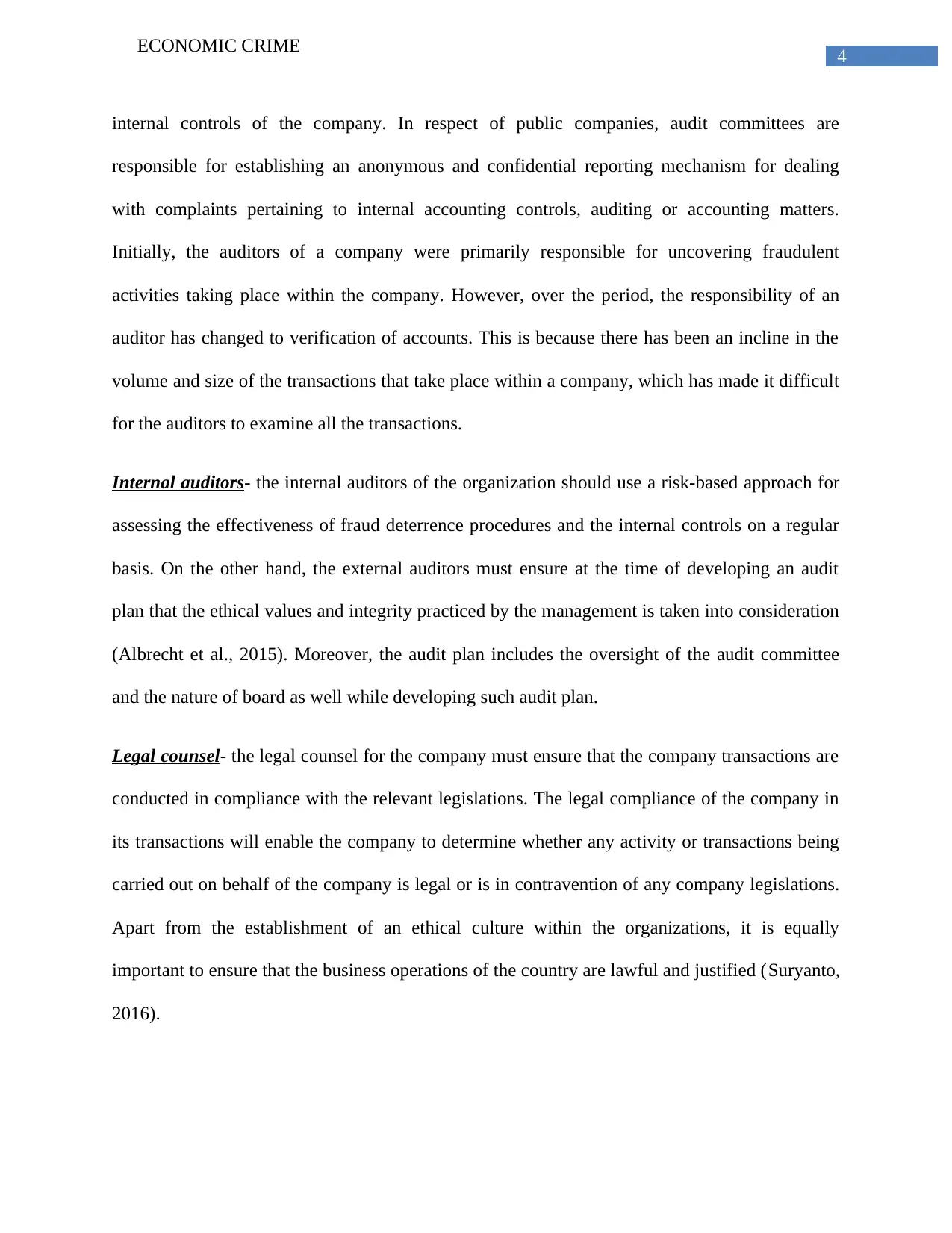
4
ECONOMIC CRIME
internal controls of the company. In respect of public companies, audit committees are
responsible for establishing an anonymous and confidential reporting mechanism for dealing
with complaints pertaining to internal accounting controls, auditing or accounting matters.
Initially, the auditors of a company were primarily responsible for uncovering fraudulent
activities taking place within the company. However, over the period, the responsibility of an
auditor has changed to verification of accounts. This is because there has been an incline in the
volume and size of the transactions that take place within a company, which has made it difficult
for the auditors to examine all the transactions.
Internal auditors- the internal auditors of the organization should use a risk-based approach for
assessing the effectiveness of fraud deterrence procedures and the internal controls on a regular
basis. On the other hand, the external auditors must ensure at the time of developing an audit
plan that the ethical values and integrity practiced by the management is taken into consideration
(Albrecht et al., 2015). Moreover, the audit plan includes the oversight of the audit committee
and the nature of board as well while developing such audit plan.
Legal counsel- the legal counsel for the company must ensure that the company transactions are
conducted in compliance with the relevant legislations. The legal compliance of the company in
its transactions will enable the company to determine whether any activity or transactions being
carried out on behalf of the company is legal or is in contravention of any company legislations.
Apart from the establishment of an ethical culture within the organizations, it is equally
important to ensure that the business operations of the country are lawful and justified (Suryanto,
2016).
ECONOMIC CRIME
internal controls of the company. In respect of public companies, audit committees are
responsible for establishing an anonymous and confidential reporting mechanism for dealing
with complaints pertaining to internal accounting controls, auditing or accounting matters.
Initially, the auditors of a company were primarily responsible for uncovering fraudulent
activities taking place within the company. However, over the period, the responsibility of an
auditor has changed to verification of accounts. This is because there has been an incline in the
volume and size of the transactions that take place within a company, which has made it difficult
for the auditors to examine all the transactions.
Internal auditors- the internal auditors of the organization should use a risk-based approach for
assessing the effectiveness of fraud deterrence procedures and the internal controls on a regular
basis. On the other hand, the external auditors must ensure at the time of developing an audit
plan that the ethical values and integrity practiced by the management is taken into consideration
(Albrecht et al., 2015). Moreover, the audit plan includes the oversight of the audit committee
and the nature of board as well while developing such audit plan.
Legal counsel- the legal counsel for the company must ensure that the company transactions are
conducted in compliance with the relevant legislations. The legal compliance of the company in
its transactions will enable the company to determine whether any activity or transactions being
carried out on behalf of the company is legal or is in contravention of any company legislations.
Apart from the establishment of an ethical culture within the organizations, it is equally
important to ensure that the business operations of the country are lawful and justified (Suryanto,
2016).
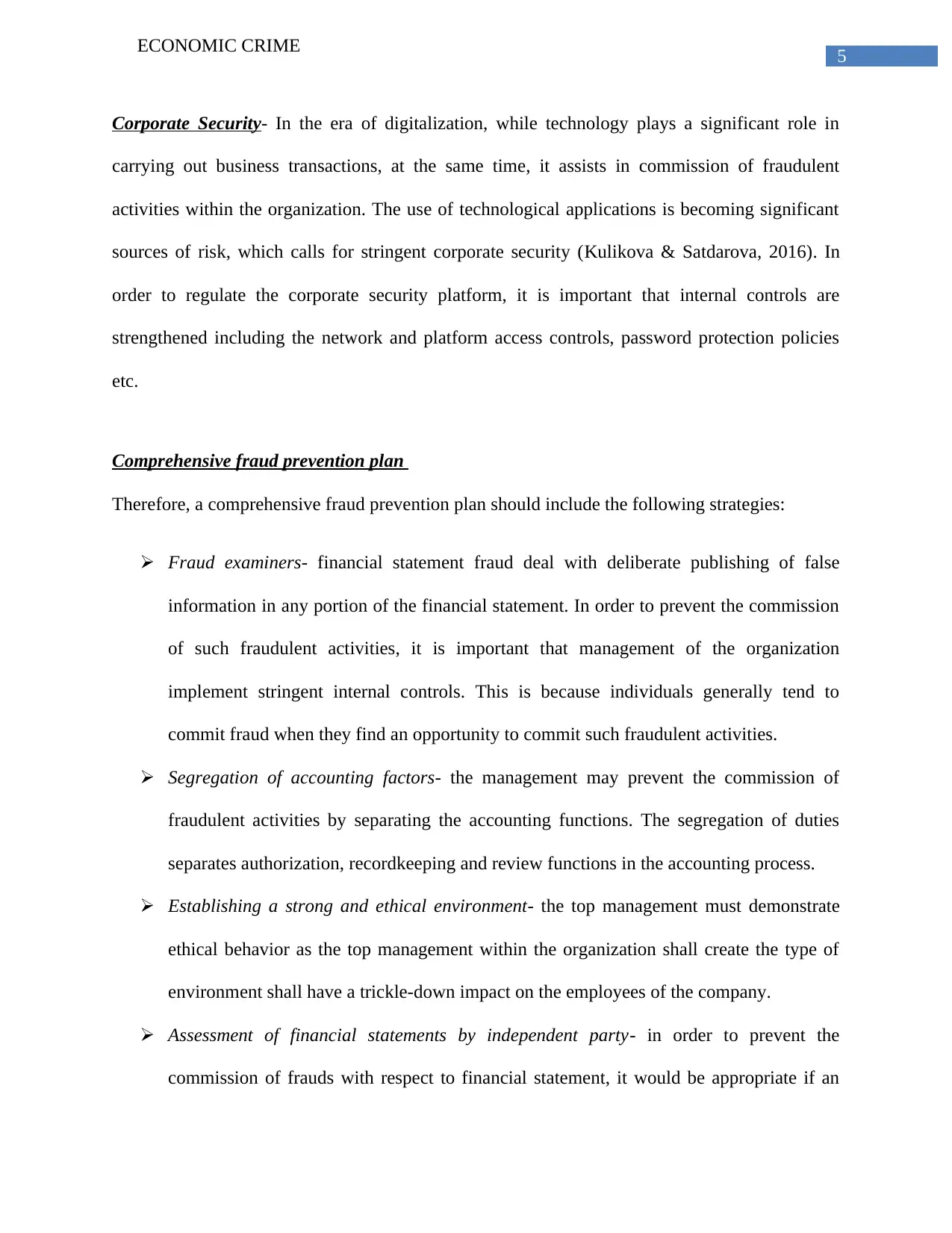
5
ECONOMIC CRIME
Corporate Security- In the era of digitalization, while technology plays a significant role in
carrying out business transactions, at the same time, it assists in commission of fraudulent
activities within the organization. The use of technological applications is becoming significant
sources of risk, which calls for stringent corporate security (Kulikova & Satdarova, 2016). In
order to regulate the corporate security platform, it is important that internal controls are
strengthened including the network and platform access controls, password protection policies
etc.
Comprehensive fraud prevention plan
Therefore, a comprehensive fraud prevention plan should include the following strategies:
Fraud examiners- financial statement fraud deal with deliberate publishing of false
information in any portion of the financial statement. In order to prevent the commission
of such fraudulent activities, it is important that management of the organization
implement stringent internal controls. This is because individuals generally tend to
commit fraud when they find an opportunity to commit such fraudulent activities.
Segregation of accounting factors- the management may prevent the commission of
fraudulent activities by separating the accounting functions. The segregation of duties
separates authorization, recordkeeping and review functions in the accounting process.
Establishing a strong and ethical environment- the top management must demonstrate
ethical behavior as the top management within the organization shall create the type of
environment shall have a trickle-down impact on the employees of the company.
Assessment of financial statements by independent party- in order to prevent the
commission of frauds with respect to financial statement, it would be appropriate if an
ECONOMIC CRIME
Corporate Security- In the era of digitalization, while technology plays a significant role in
carrying out business transactions, at the same time, it assists in commission of fraudulent
activities within the organization. The use of technological applications is becoming significant
sources of risk, which calls for stringent corporate security (Kulikova & Satdarova, 2016). In
order to regulate the corporate security platform, it is important that internal controls are
strengthened including the network and platform access controls, password protection policies
etc.
Comprehensive fraud prevention plan
Therefore, a comprehensive fraud prevention plan should include the following strategies:
Fraud examiners- financial statement fraud deal with deliberate publishing of false
information in any portion of the financial statement. In order to prevent the commission
of such fraudulent activities, it is important that management of the organization
implement stringent internal controls. This is because individuals generally tend to
commit fraud when they find an opportunity to commit such fraudulent activities.
Segregation of accounting factors- the management may prevent the commission of
fraudulent activities by separating the accounting functions. The segregation of duties
separates authorization, recordkeeping and review functions in the accounting process.
Establishing a strong and ethical environment- the top management must demonstrate
ethical behavior as the top management within the organization shall create the type of
environment shall have a trickle-down impact on the employees of the company.
Assessment of financial statements by independent party- in order to prevent the
commission of frauds with respect to financial statement, it would be appropriate if an
⊘ This is a preview!⊘
Do you want full access?
Subscribe today to unlock all pages.

Trusted by 1+ million students worldwide
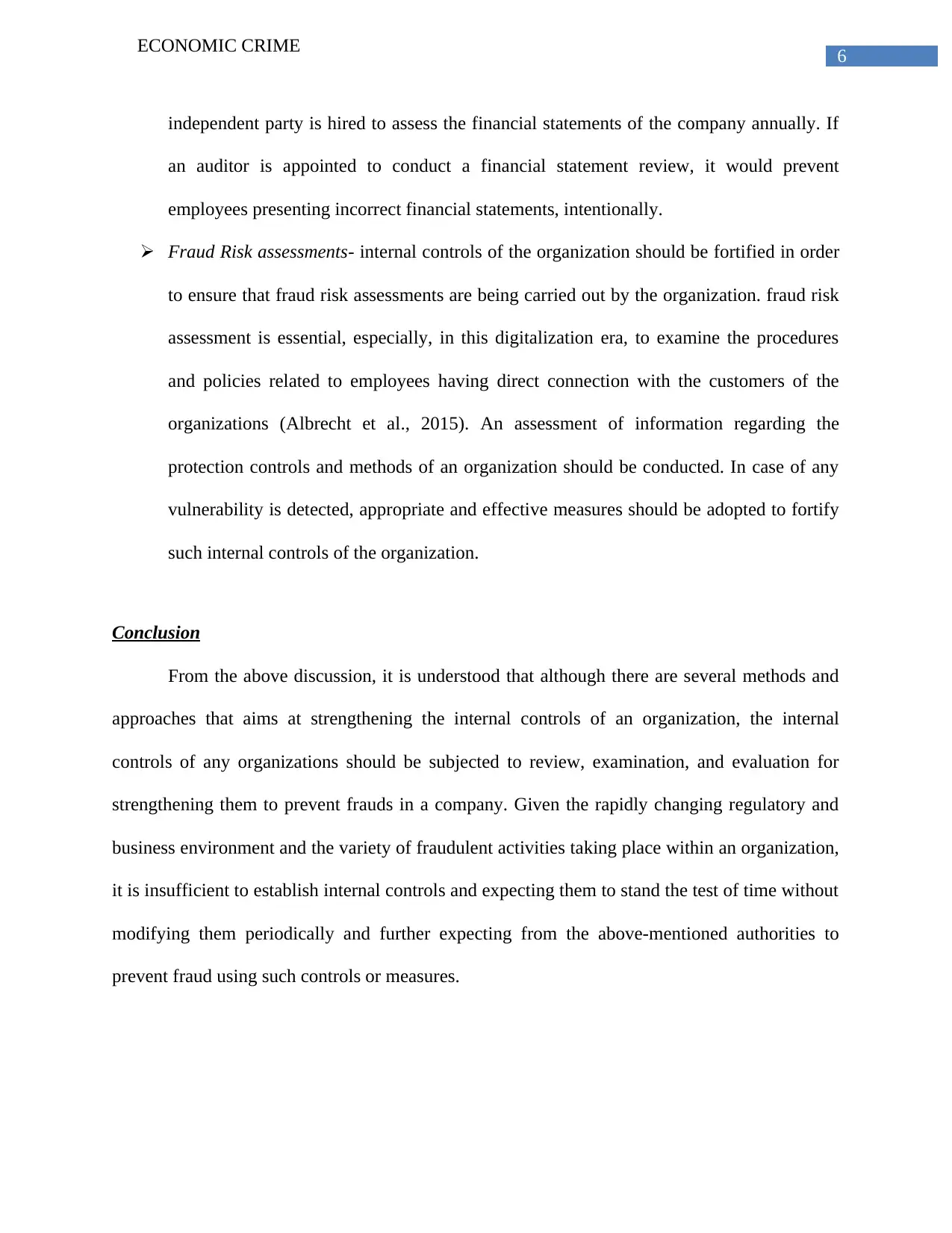
6
ECONOMIC CRIME
independent party is hired to assess the financial statements of the company annually. If
an auditor is appointed to conduct a financial statement review, it would prevent
employees presenting incorrect financial statements, intentionally.
Fraud Risk assessments- internal controls of the organization should be fortified in order
to ensure that fraud risk assessments are being carried out by the organization. fraud risk
assessment is essential, especially, in this digitalization era, to examine the procedures
and policies related to employees having direct connection with the customers of the
organizations (Albrecht et al., 2015). An assessment of information regarding the
protection controls and methods of an organization should be conducted. In case of any
vulnerability is detected, appropriate and effective measures should be adopted to fortify
such internal controls of the organization.
Conclusion
From the above discussion, it is understood that although there are several methods and
approaches that aims at strengthening the internal controls of an organization, the internal
controls of any organizations should be subjected to review, examination, and evaluation for
strengthening them to prevent frauds in a company. Given the rapidly changing regulatory and
business environment and the variety of fraudulent activities taking place within an organization,
it is insufficient to establish internal controls and expecting them to stand the test of time without
modifying them periodically and further expecting from the above-mentioned authorities to
prevent fraud using such controls or measures.
ECONOMIC CRIME
independent party is hired to assess the financial statements of the company annually. If
an auditor is appointed to conduct a financial statement review, it would prevent
employees presenting incorrect financial statements, intentionally.
Fraud Risk assessments- internal controls of the organization should be fortified in order
to ensure that fraud risk assessments are being carried out by the organization. fraud risk
assessment is essential, especially, in this digitalization era, to examine the procedures
and policies related to employees having direct connection with the customers of the
organizations (Albrecht et al., 2015). An assessment of information regarding the
protection controls and methods of an organization should be conducted. In case of any
vulnerability is detected, appropriate and effective measures should be adopted to fortify
such internal controls of the organization.
Conclusion
From the above discussion, it is understood that although there are several methods and
approaches that aims at strengthening the internal controls of an organization, the internal
controls of any organizations should be subjected to review, examination, and evaluation for
strengthening them to prevent frauds in a company. Given the rapidly changing regulatory and
business environment and the variety of fraudulent activities taking place within an organization,
it is insufficient to establish internal controls and expecting them to stand the test of time without
modifying them periodically and further expecting from the above-mentioned authorities to
prevent fraud using such controls or measures.
Paraphrase This Document
Need a fresh take? Get an instant paraphrase of this document with our AI Paraphraser
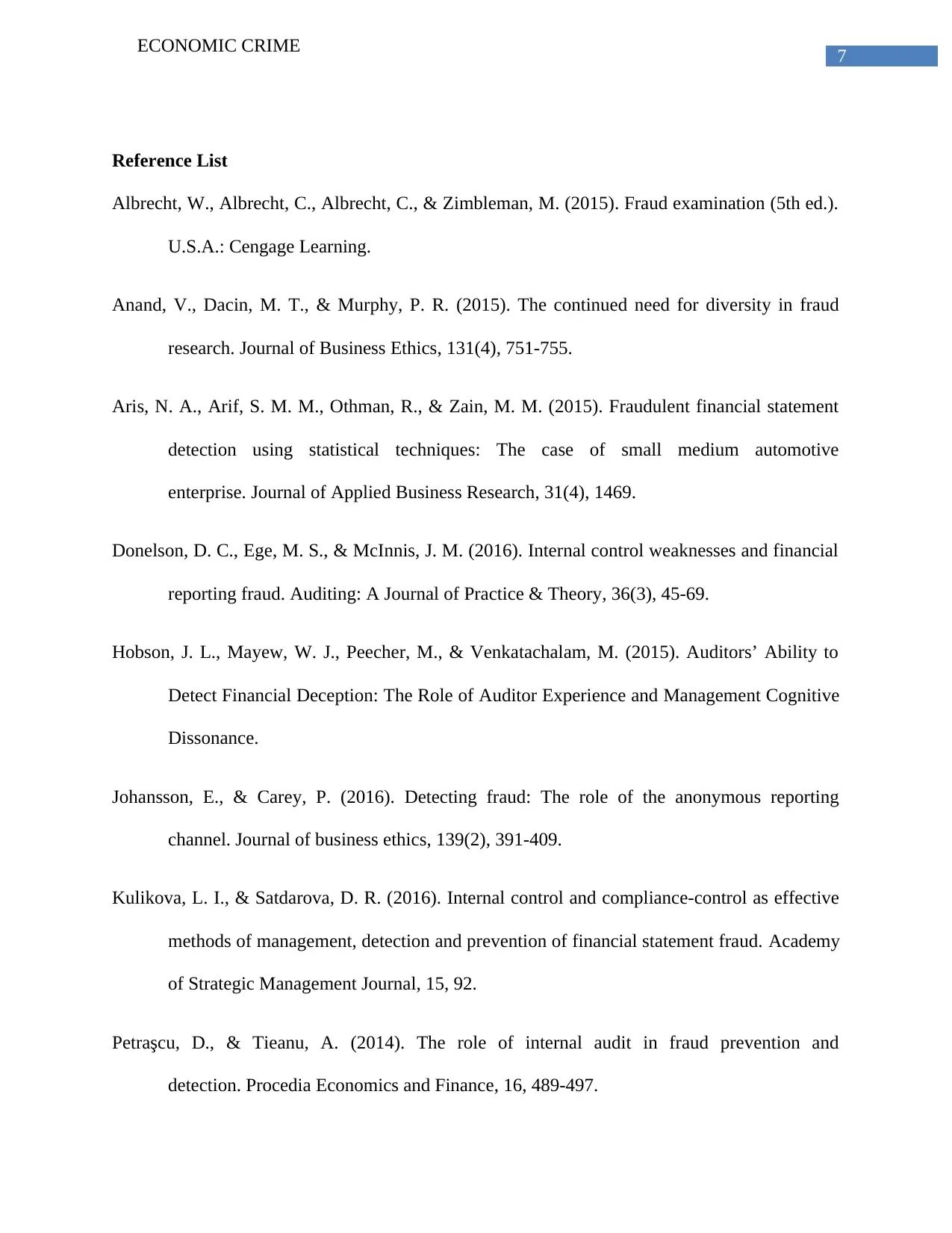
7
ECONOMIC CRIME
Reference List
Albrecht, W., Albrecht, C., Albrecht, C., & Zimbleman, M. (2015). Fraud examination (5th ed.).
U.S.A.: Cengage Learning.
Anand, V., Dacin, M. T., & Murphy, P. R. (2015). The continued need for diversity in fraud
research. Journal of Business Ethics, 131(4), 751-755.
Aris, N. A., Arif, S. M. M., Othman, R., & Zain, M. M. (2015). Fraudulent financial statement
detection using statistical techniques: The case of small medium automotive
enterprise. Journal of Applied Business Research, 31(4), 1469.
Donelson, D. C., Ege, M. S., & McInnis, J. M. (2016). Internal control weaknesses and financial
reporting fraud. Auditing: A Journal of Practice & Theory, 36(3), 45-69.
Hobson, J. L., Mayew, W. J., Peecher, M., & Venkatachalam, M. (2015). Auditors’ Ability to
Detect Financial Deception: The Role of Auditor Experience and Management Cognitive
Dissonance.
Johansson, E., & Carey, P. (2016). Detecting fraud: The role of the anonymous reporting
channel. Journal of business ethics, 139(2), 391-409.
Kulikova, L. I., & Satdarova, D. R. (2016). Internal control and compliance-control as effective
methods of management, detection and prevention of financial statement fraud. Academy
of Strategic Management Journal, 15, 92.
Petraşcu, D., & Tieanu, A. (2014). The role of internal audit in fraud prevention and
detection. Procedia Economics and Finance, 16, 489-497.
ECONOMIC CRIME
Reference List
Albrecht, W., Albrecht, C., Albrecht, C., & Zimbleman, M. (2015). Fraud examination (5th ed.).
U.S.A.: Cengage Learning.
Anand, V., Dacin, M. T., & Murphy, P. R. (2015). The continued need for diversity in fraud
research. Journal of Business Ethics, 131(4), 751-755.
Aris, N. A., Arif, S. M. M., Othman, R., & Zain, M. M. (2015). Fraudulent financial statement
detection using statistical techniques: The case of small medium automotive
enterprise. Journal of Applied Business Research, 31(4), 1469.
Donelson, D. C., Ege, M. S., & McInnis, J. M. (2016). Internal control weaknesses and financial
reporting fraud. Auditing: A Journal of Practice & Theory, 36(3), 45-69.
Hobson, J. L., Mayew, W. J., Peecher, M., & Venkatachalam, M. (2015). Auditors’ Ability to
Detect Financial Deception: The Role of Auditor Experience and Management Cognitive
Dissonance.
Johansson, E., & Carey, P. (2016). Detecting fraud: The role of the anonymous reporting
channel. Journal of business ethics, 139(2), 391-409.
Kulikova, L. I., & Satdarova, D. R. (2016). Internal control and compliance-control as effective
methods of management, detection and prevention of financial statement fraud. Academy
of Strategic Management Journal, 15, 92.
Petraşcu, D., & Tieanu, A. (2014). The role of internal audit in fraud prevention and
detection. Procedia Economics and Finance, 16, 489-497.
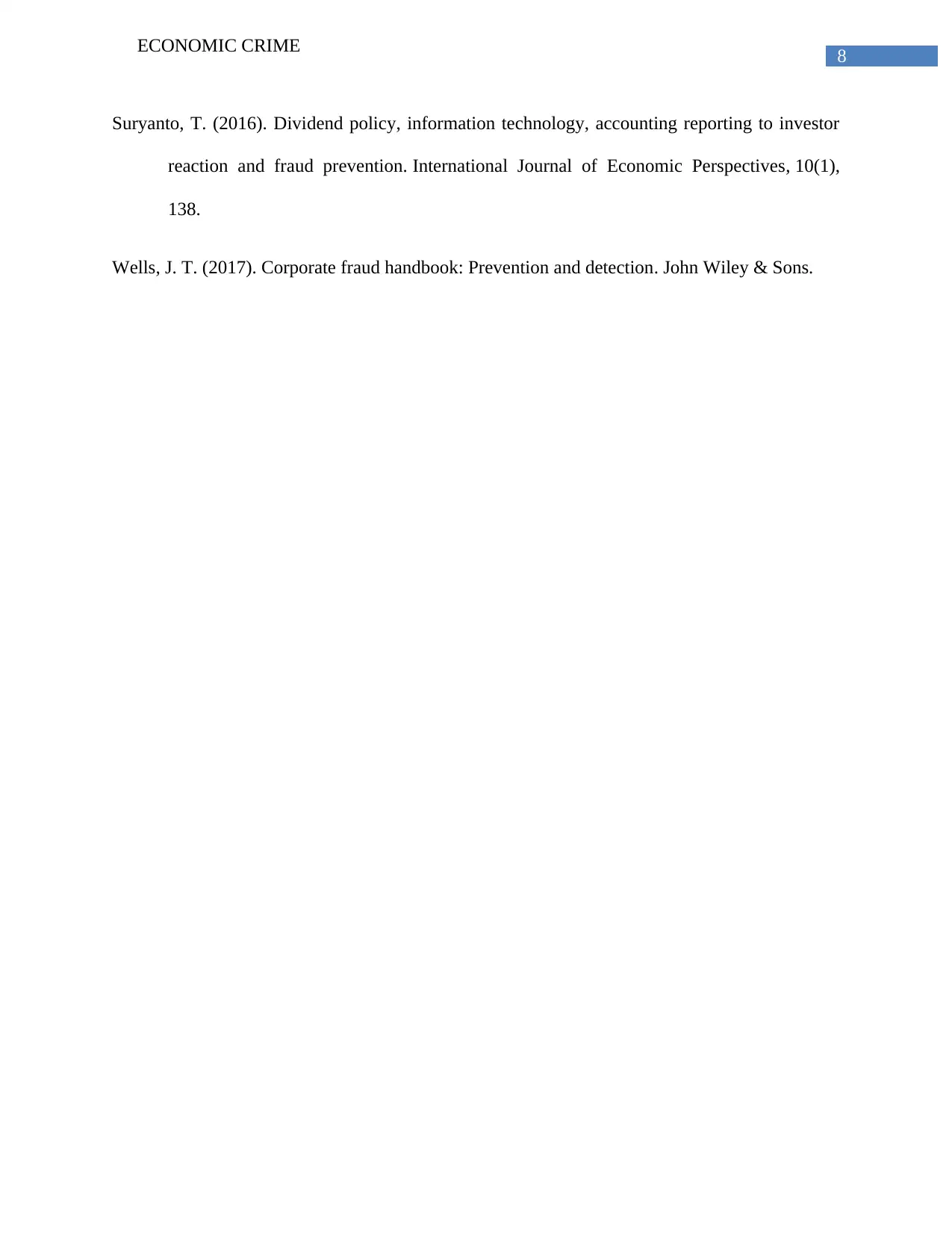
8
ECONOMIC CRIME
Suryanto, T. (2016). Dividend policy, information technology, accounting reporting to investor
reaction and fraud prevention. International Journal of Economic Perspectives, 10(1),
138.
Wells, J. T. (2017). Corporate fraud handbook: Prevention and detection. John Wiley & Sons.
ECONOMIC CRIME
Suryanto, T. (2016). Dividend policy, information technology, accounting reporting to investor
reaction and fraud prevention. International Journal of Economic Perspectives, 10(1),
138.
Wells, J. T. (2017). Corporate fraud handbook: Prevention and detection. John Wiley & Sons.
⊘ This is a preview!⊘
Do you want full access?
Subscribe today to unlock all pages.

Trusted by 1+ million students worldwide
1 out of 9
Related Documents
Your All-in-One AI-Powered Toolkit for Academic Success.
+13062052269
info@desklib.com
Available 24*7 on WhatsApp / Email
![[object Object]](/_next/static/media/star-bottom.7253800d.svg)
Unlock your academic potential
Copyright © 2020–2026 A2Z Services. All Rights Reserved. Developed and managed by ZUCOL.





